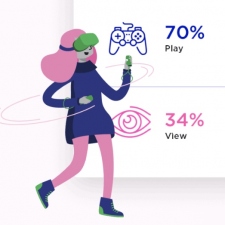
Gone are the days when women were a small percentage of gamers, as we now see a much more even split between men and women playing video games. Therefore, it is important for anyone developing games to understand the experiences and preferences that women want from their games and how they may behave as players. Not only does this make for a better and more diverse gaming environment but it could also be incredibly important to capturing a broader audience.
As part of Newzoo’s Global Gamer Study, insight and data surrounding women gamers, such as where they play and if they are paying players was shared and it’s well worth a deeper dive.
Who’s playing what?
After an examination of the total online population surveyed for 2023’s Global Gamer Study these key insights were discovered:
- Out of the total online population, 72% of women play video games
- Out of the total who say they play video games 45% are women and 55% are men
- Half of women players are payers
- When asked if they consider themselves a gamer 36% of women said they would while 31% of women said other people call them a gamer
- Both women and men who play games consider diversity in games important with 65% of men and 62% of women affirming the point
- 44% of female players play only on mobile platforms
This data shows that of the people surveyed, nearly half of the gamers are made up of women. While some may not class themselves as such, this could conclude that since the preference for many women is on mobile, they see themselves more as casual players. However, further data showed that 38% of female console gamers identify as ‘core gamers’ and 36% for PC, which shows that women are increasingly invested in gaming across various platforms.
Both men and women found it important that the gaming space consider and represent inclusivity and diversity in games. It is becoming increasingly important to have representation in games where every type of player feels they have someone they can relate to or perhaps see themselves in.
Not only does this show positive growth for the culture of gaming, but it also makes good business sense, as a player who can connect with a game is more likely to be invested in the long run.